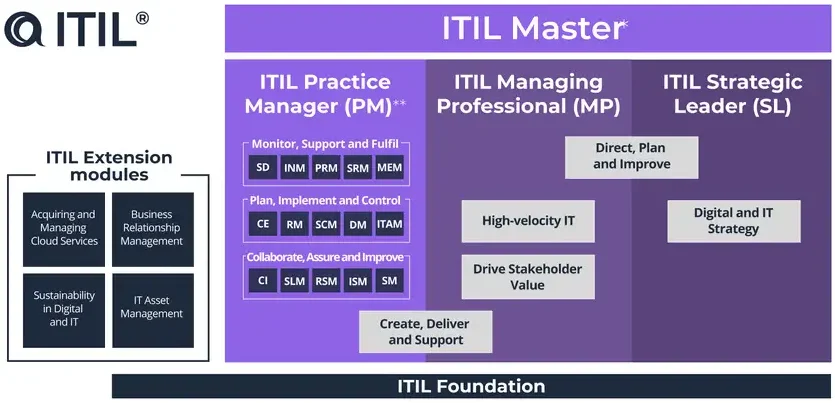Introduction to ITIL®4
✅ What is ITIL?
✅ Purpose and Benefits
ITIL’s primary goal is to align IT services with business needs while enhancing service quality for users. By following ITIL practices, organizations can deliver reliable, efficient, and cost-effective IT services.
✅ A Brief History
✅ What ITIL Covers
The ITIL framework addresses a wide range of topics, including:
- Service Strategy – defining how to deliver value to customers
- Service Design – planning and structuring IT services
- Service Transition – managing changes and deployments
- Service Operation – ensuring efficient day-to-day operations
- Continual Improvement – driving ongoing enhancements in service delivery
✅ The Evolution to ITIL4
ITIL4 builds on this legacy by incorporating modern approaches such as Agile, DevOps, and Lean IT. As a result, it offers a more flexible and forward-thinking framework that supports today’s fast-paced, technology-driven environments.
ITIL4, introduced in 2019, represents the most recent iteration of the ITIL framework. It incorporates substantial updates from earlier versions by integrating modern methodologies such as Agile, Ops, and Lean to address needs of evolving digital landscapes. ITIL4 provides a more cohesive approach to IT service management, enabling organizations to effectively to rapid technological advancements.
ITIL4 Certification
✅ Why ITIL4 Certification Matters
The ITIL4 certification equips candidates with the most up-to-date tools and best practices in IT service management. By integrating modern methodologies such as Agile, DevOps, and Lean IT, it prepares professionals to thrive in today’s dynamic digital environment.
As a result, certified professionals gain a competitive edge and increase their value to any organization. In addition, ITIL4 offers essential frameworks and practices that benefit businesses across all industries, regardless of size or sector.
Consequently, employers actively seek ITIL4-certified professionals to help drive efficiency, innovation, and strategic alignment. Moreover, earning this certification not only validates technical expertise, but also demonstrates a strong commitment to continuous improvement—a highly valued trait in today’s fast-paced professional landscape.
✅ ITIL4 Certification Pathways
Managing Professional (MP)
Tailored for IT professionals working in technology and digital teams, this stream includes four modules:
- Create, Deliver and Support – Focuses on essential service management activities and service development.
- Drive Stakeholder Value – Explores engagement and interaction between service providers and customers.
- High-Velocity IT – Examines how digital organizations operate at speed and scale.
- Direct, Plan and Improve – Equips practitioners with tools to build a learning and continuously improving IT organization.
Strategic Leader (SL)
Designed for current and aspiring leaders, this stream includes two modules:
- Direct, Plan and Improve – Shared with the MP stream, it emphasizes aligning IT and business strategies.
- Digital and IT Strategy – Helps leaders develop and implement effective digital strategies.
Master
The pinnacle of ITIL certification, the Master level requires candidates to hold the Practice Manager, Managing Professional, and Strategic Leader certifications, along with demonstrated practical experience in applying ITIL principles.

✅ ITIL4 Extension Modules
ITIL 4 also includes extension modules that address emerging trends and evolving technologies. While not mandatory, these modules serve as valuable resources for professionals who want to stay current and expand their ITIL knowledge.
There are currently four extension modules available, each designed to complement the core framework and enhance adaptability in a rapidly changing digital landscape.
Why Get ITIL 4 Certified?
The ITIL4 certification equips candidates with the most up-to-date tools and best practices in IT service management. By integrating modern methodologies such as Agile, DevOps, and Lean IT, it prepares professionals to thrive in today’s dynamic digital environment.
As a result, candidates who earn the ITIL4 certification gain a competitive edge, becoming more valuable to any organization. Moreover, ITIL4 offers essential frameworks and practices that benefit businesses across all industries, regardless of size or sector.
Consequently, employers actively seek ITIL4-certified professionals to help drive efficiency and innovation. Earning this certification not only validates technical expertise, but also demonstrates a strong commitment to continuous improvement—a highly valued trait in today’s fast-paced professional landscape.
Benefits of ITIL for Organisations
Implementing ITIL4 delivers powerful benefits to organizations of all sizes. Specifically, it helps improve performance, reduce risk, and align IT with strategic goals.
Here are some of the key advantages:
- First, ITIL4 helps you improve service quality. By applying its best practices, organizations deliver more reliable and consistent IT services, which boosts customer satisfaction.
- Next, it enables you to increase efficiency. ITIL4 streamlines IT processes and eliminates unnecessary steps, making operations more cost-effective.
- In addition, ITIL4 helps align IT with business goals. It ensures that IT services support strategic objectives, which drives better business outcomes.
- Furthermore, it allows you to enhance risk management. ITIL4 guides teams in identifying and mitigating risks, which reduces service disruptions and other IT-related issues.
- Finally, ITIL4 encourages a culture of continuous improvement. It promotes regular reviews and refinements, helping teams consistently enhance IT services over time.
Who Manages ITIL?
Originally developed by the CCTA, which later became part of the UK’s Office of Government Commerce (OGC), ITIL laid the foundation for modern IT service management.
Today, Axelos maintains and evolves the ITIL framework, ensuring it stays relevant and up to date. In addition, Axelos actively promotes global adoption by working closely with a worldwide network of accredited training organizations—such as BrightOak—and examination institutes. Through these partnerships, they deliver ITIL training and certification programs to both individuals and organizations.
In 2021, PeopleCert acquired Axelos, and since then, the two organizations have collaborated to ensure the ITIL 4 framework remains consistent and accessible across the globe.
Furthermore, PeopleCert, as a leading examination institute, provides certification exams in Business, IT, and Language disciplines. By partnering with training providers worldwide, PeopleCert helps keep ITIL4 and other methodologies relevant, standardized, and widely available.
Conclusion: Getting ITIL4 Certified is a Good Career Move
In today’s digital era, effective IT service management plays a vital role in driving business success. As a result, organizations increasingly turn to ITIL4, which empowers teams with a comprehensive framework that enhances service quality, boosts efficiency, and aligns IT operations with business goals.
Moreover, with multiple certification levels available, ITIL4 opens valuable career opportunities for professionals aiming to advance in ITSM.
Currently, Axelos, in collaboration with PeopleCert, actively governs and evolves ITIL to meet the industry’s changing demands. Consequently, the framework remains relevant and impactful in a fast-paced environment.
Whether you’re just starting out or looking to deepen your expertise, applying ITIL best practices consistently delivers measurable benefits to your organization. Ultimately, it supports your growth in the ever-expanding technology landscape.





